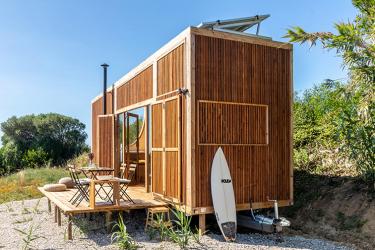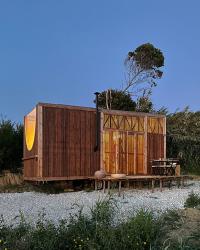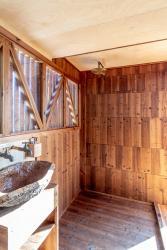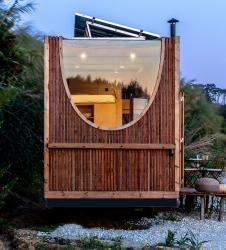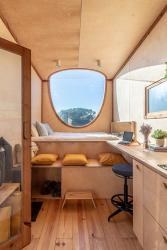Portugal
With a world so big, homeowners and travelers have started to look for smaller, more portable living options. Tiny homes are on the rise with individuals transforming RVs, vans, sheds and more into comfortable, compact living spaces. Some, like those at Madeiguincho, are forging their own path by building custom tiny homes. This led to the creation of the Tiny On Wheels (TOW) project, now called Ursa. The tiny home is a completely off-grid home on wheels that uses rainwater, solar panels and other design techniques to operate completely under the radar.
The tiny home consists of a small rectangular structure featuring a small porch and an upper-level sleeping area. Upon entry into the home, visitors are greeted with an open kitchen, dining and living room. Under the sink cabinets and open shelving provide storage on the lower level and the kitchen counter extends out to provide a small office space. The far end of the home contains a platform with a bed and additional storage beneath two built-in benches. No need for a couch or closet! A large window sits above the bed creating a convenient spot to sit and enjoy the views outside of the home. The home’s interior is lined with birch plywood panels and the exterior is wrapped with thermowood, a heat-treated timber.
Since the home is meant to be totally off-grid, it comes with additional features to provide an optimal living environment. As mentioned previously, the tiny home relies on rainwater as a primary water source. Once collected, the rainwater is run through a pressurized water system. This pumps the water into an “801 heat accumulator tank that supplies water to the three plumbing fixtures.” Below the sink sits a 3-stage reverse osmosis filter for drinking water. The water used in the fixtures is then stored in a tank and can be reused for watering plants , creating a constant water cycle within the home. To power the three fixtures, as well as the refrigerator and glass-ceramic cooktop, five solar panels were placed on top of the roof. Finally, to complete the off-grid additions, a dry toilet is installed in the bathroom and connects to the electricity produced by the solar panels to make compost.
With the whole world to explore and the ability to live off-grid at your fingertips, Madeiguincho has made it easy to live on the go. The Ursa TOW invites us to think outside the box and reimagine our modern lives completely off the grid.


